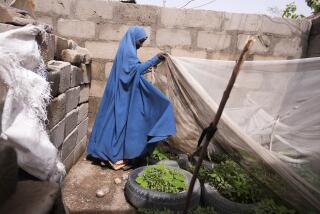Economic Setbacks Shattering African Families
ABIDJAN, Ivory Coast — Women who struggle to survive in Africa’s urban jungles and denuded countryside have a new fight on their hands: keeping their men.
More than a decade of mounting hardship is breaking the links of extended black African families, once so strong that cousins are called sisters and brothers.
Western-style family units, headed by women like Adele Ahou, are increasingly common.
Her lover, a banker, abandoned her and their 11-month-old son, Thierry, when he lost his job.
In June, they began sleeping beneath the stalls of Adjame market, which sells everything from fried fish to umbrellas, for protection from the chilling rain.
One night, police opened fire on robbers and killed a woman and the baby she was carrying on her back.
In the morning, Ahou rented a room.
“The rent is more than I earn in a month and I don’t know where I’ll get the money, but that could have been me and my son,” she said, clutching Thierry, who sucked at her breast.
She does not blame his father, who also supported a wife and four children in his home village. “Don’t condemn him, the poor man, he is suffering too,” she said.
Ahou survives by selling cassava, earning the equivalent of $1.85 on a good day. She chops the starchy roots into three or four pieces, she said, because “people can’t even afford to buy a whole cassava anymore.”
“The big bosses had no problems supporting three families in the good days,” said Papa Kane, director of the InterAfrican Centre for Vocational Training Development, which conducts literacy classes for women. “Today, he just doesn’t have it, so one or two families are left to fend for themselves.”
Women everywhere have been hurt by the global recession, but in Africa, more than jobs is at stake.
Peasants who took several wives and had many children to work the fields are deserting their villages, joining the hopeless urban swarms. They often take mistresses, who usually have children because most African men object to contraception and abortion is generally either illegal or unavailable.
“Men who come from other countries or villages to work do not want to marry someone outside their ethnic group, but that won’t stop them taking concubines,” Kane said.
“We’re building a generation of violence. In the rural areas, in the urban sprawls, our entire social system is being jolted: The increasing crime, the street children, child prostitution, abandoned women, this is just the beginning.”
Reports presented to a symposium in Nigeria said women criminals were turning from petty theft to drug-trafficking and murder, and that economic hardship was driving more women to crime.
Bernadette Aya left a 6-month-old daughter at home with her unemployed husband to work as a maid. She considers herself luckier than his other wife, who supports four children in the countryside.
“Before, I would have been able to send my boy to his father’s family in the village,” she said. “But I can’t do that anymore. There’s no money and no food.”
African women work twice as long as men, 15 to 18 hours a day, but earn only one-tenth as much. Most of them farm or sell food and consumer goods on the streets of towns. In the country, some women walk 5 miles for water.
Women grow 80% of food produced in Africa, yet few are allowed to own the land they work. They have little access to credit, and agricultural extension workers address themselves to men.
According to the African Development Bank, this failure to recognize women’s role in farming has been a major factor in continent’s failure to feed itself.
African leaders acknowledge the need to promote the interests of women but have done little more than create ministries that do not have enough money and often are led by the only woman in the Cabinet.
When Alice Sorgho-Ouedraogo organizes seminars on women’s development at the International Labor Organization, a U.N. agency, she has to specify that women be included, “because the governments often name all-male teams.”
Lack of education is a major drawback. The development bank said in 1984 that 90% of the women in seven African countries were illiterate.
African women even discriminate against themselves. They are the ones who mutilate young girls, circumcising them to make sure that they get little pleasure from sex.
Beatrice Aya, a widow, supports four children by selling cassava fritters. Three are of school age, but she could afford the school fees for only two, so she kept her daughter home.
“Boys have to grow up to provide for their families,” she said. “They’re more important.”
More to Read
Sign up for Essential California
The most important California stories and recommendations in your inbox every morning.
You may occasionally receive promotional content from the Los Angeles Times.










